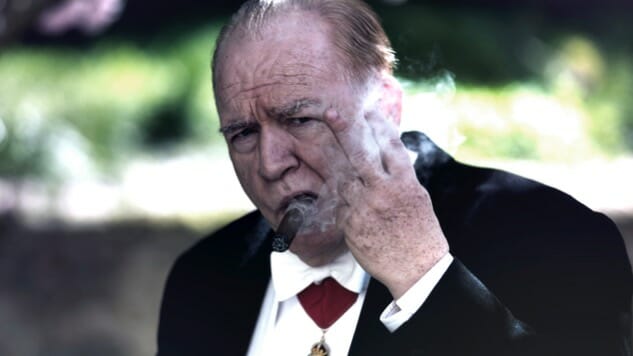Brian Cox on Playing a Man of Destiny, and the Shakespearean World of Churchill
Movies Features brian cox
For five decades, British movie stars have been unable to resist the lure of Winston Churchill, depicting him on screen time and again, typically in hero mode, rallying England in its darkest hour during World War II. In fact, Gary Oldman will star as the British Prime Minister in a film called Darkest Hour later this year, joining Albert Finney, Brendan Gleeson, Bob Hoskins, and Michael Gambon who have played the iconic politician.
But first, on Friday, June 2nd comes Churchill, with Brian Cox portraying a different man: during the crucial days leading up to D-Day in 1944, Churchill is stuck battling depression and reliving his own darkest hour from World War I; outmaneuvered by General Dwight Eisenhower and other allies, the prime minister is losing relevance at the very moment he believes he ought to be changing history once again.
“I’ve always liked larger-than-life characters, and this is a Churchill we have not seen and an experience we’ve not had,” says Cox, while sitting at the Carnegie Club in midtown Manhattan, beneath a photo of Churchill in his famous hat with his signature cigar. “It’s Shakespearean, it’s like King Lear.”
While the Scottish-born Cox is best known here for roles in two Jason Bourne movies, Braveheart, Troy and Rushmore, along with TV series like Deadwood, in England, he’s also regarded as a top-flight stage actor, having played everyone from Titus Andronicus, to Petruchio, to Lear himself during his years with the Royal Shakespeare Company and the National Theatre. “I approached the part very much like I approached playing Lear,” he says.
Cox says this crucial moment in Churchill’s career has often been downplayed or hidden by his family and right-wing historians to protect the great man’s legacy, but that it is depicted in the diaries of those who were there, including Eisenhower (played by John Slattery in the film).
“It’s there and it tells you the difficulties Churchill was having, and [problems] that they were having with him and out of that this drama unfolds,” he says.
To capture that well-known face (Cox repeats the famous phrase, “all babies look like Winston Churchill”) Cox shed his hair, which left him feeling “very exposed.” And while Oldman relied heavily on prosthetics for his forthcoming star turn, Cox resisted all except to fill in his cleft chin. That meant gaining 30 pounds for the role. “My weight was going up anyway so I just accelerated it,” he says. “I indulged myself, I grazed.”
(Conscious of his health, especially because he has diabetes, and young children and because he has recently lost numerous contemporaries like Alan Rickman, Cox went on a doctor-imposed regimen after filming and shed all that weight and more.)
Equally challenging was finding Churchill’s voice. For nearly the entire movie, we are in the company of the private Churchill, a desperate man, often drunk or depressed, striving ineffectively to thwart his own side’s plan. The voice made famous by those rousing speeches, especially on the radio during the early days of the war, would have felt jarring in these scenes and Cox says it was tough to find that private voice. “Even when he was being interviewed he was always giving a performance,” Cox says, explaining that to uncover his character he looked to Churchill’s childhood. Separated from his parents, living at Blenheim Castle in anticipation that he might become the Duke of Marlborough, Churchill was an unhappy and isolated boy. “I came from a very different class, I certainly wasn’t in Blenheim, but I related to that sense that you are an outsider and that you have to take care of yourself and prove yourself.”
Cox had an intimate knowledge of the politician even as a child; he grew up in Dundee, which Churchill had long before represented in Parliament and Cox’s uncle would regale him with stories of this “contentious character.”
“’Ah, Churchill, he can’t be trusted,’ my uncle would say, because Churchill went from being a liberal to being a Tory,” Cox recalls. One infamous anecdote arose when Churchill was sick and was being carried to a meeting in town by several locals who were bearing him forth in a chair. “My uncle said, ‘I shouted to these guys, ‘How much did he pay ya,’ and one said a quid’ and I said,’We’ll give ya two if ya drop him.’”
Cox also researched World War I and the ambitious plan Churchill, then First Lord of the Admiralty, promoted to open a new front by attacking the Turks at Gallopoli, a move which he pursued despite not being given enough troops. It proved a catastrophic disaster, with the Allies suffering 250,000 casualties and 46,000 deaths. It was this fatal miscalculation that gave him such grave doubts about D-Day.
“He knew it was a fuck-up and he owned it, but it never left him and I believe it was the elephant in the room,” Cox says.
For Cox, Churchill was a badly flawed man, but he believes the movie will ultimately resonate, especially in these times.
“It shows people what leadership really means, and what the price of leadership is, and how people step up to the plate even in those situations. We’re sadly lacking people like him—we need the Mandelas and the Churchills, the men of destiny.”